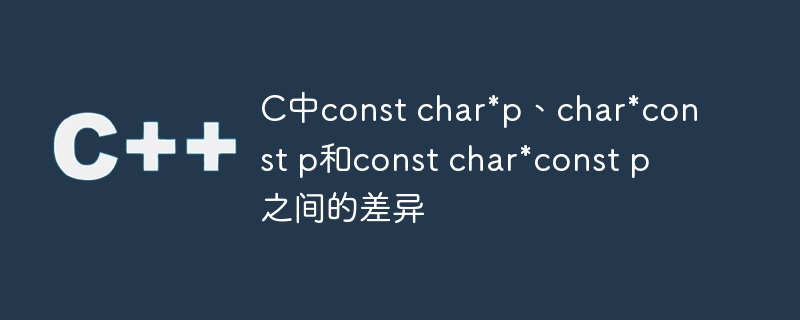C の const char*p、char*const p、および const char*const p の違い
- PHPz転載
- 2023-09-08 19:25:03889ブラウズ

ポインタ
C プログラミング言語では、*p はポインタに格納された値を表し、p は値のアドレスを表します。ポインタ。
const char* および char const* は、ポインタが定数文字を指すことができ、ポインタが指す文字の値は変更できないことを示します。ただし、ポインターは定数ではなく、別の定数文字を指すことができるため、その値を変更することができます。
char* const は、ポインタが文字を指すことができ、ポインタが指す文字の値を変更できることを意味します。ただし、ポインタは定数になっており、別の文字を指すことができないため、その値を変更することはできません。
const char* const は、ポインタが定数文字を指すことができ、ポインタが指す文字の値は変更できないことを意味します。また、ポインタは定数になっており、別の定数文字を指すことができないため、その値を変更することもできません。
名前付け構文の原則は右から左です。
// constant pointer to constant char const char * const // constant pointer to char char * const // pointer to constant char const char *
例 (C)
エラーのあるコードのコメントを解除し、エラーを表示します。
リアルタイム デモンストレーション
#include <stdio.h>
int main() {
//Example: char const*
//Note: char const* is same as const char*
const char p = 'A';
// q is a pointer to const char
char const* q = &p;
//Invalid asssignment
// value of p cannot be changed
// error: assignment of read-only location '*q'
//*q = 'B';
const char r = 'C';
//q can point to another const char
q = &r;
printf("%c</p><p>", *q);
//Example: char* const
char u = 'D';
char * const t = &u;
//You can change the value
*t = 'E';
printf("%c", *t);
// Invalid asssignment
// t cannot be changed
// error: assignment of read-only variable 't'
//t = &r;
//Example: char const* const
char const* const s = &p;
// Invalid asssignment
// value of s cannot be changed
// error: assignment of read-only location '*s'
// *s = 'D';
// Invalid asssignment
// s cannot be changed
// error: assignment of read-only variable 's'
// s = &r;
return 0;
}出力
C E
以上がC の const char*p、char*const p、および const char*const p の違いの詳細内容です。詳細については、PHP 中国語 Web サイトの他の関連記事を参照してください。
声明:
この記事はtutorialspoint.comで複製されています。侵害がある場合は、admin@php.cn までご連絡ください。

